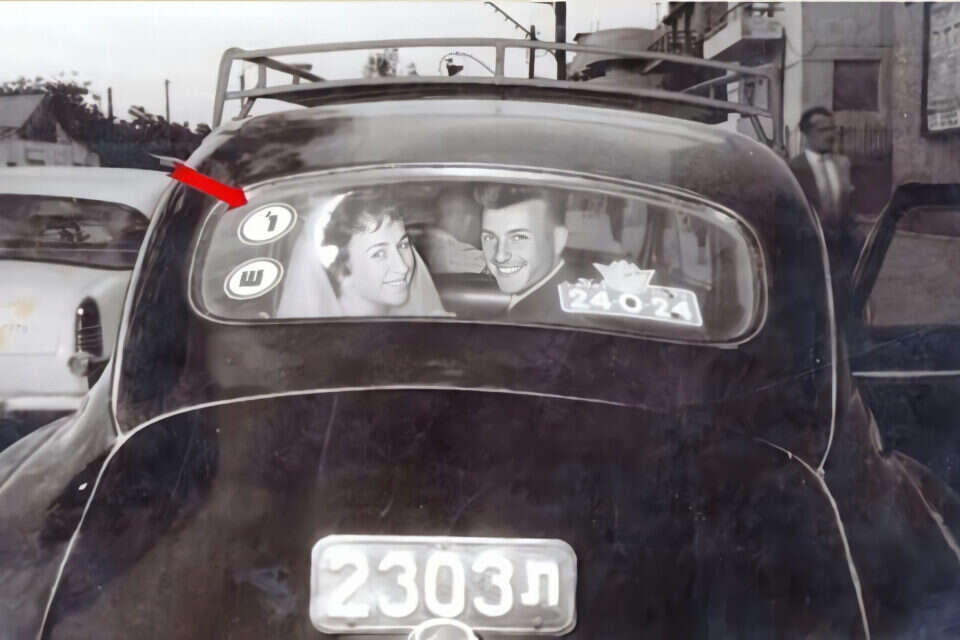On Fridays and Saturdays in the last weekend of June 1952 the traffic of most vehicles stopped, the roads in the cities became sidewalks and lots of people walked back and forth along them, his expression saying indignation and anger.
It was not Yom Kippur earlier than usual, but the first weekend when the public was forced to shut down their vehicles for two days a week under the direction of Transport Minister David Pinkas, with the aim of reducing gasoline use in a time of global energy crisis.
Since Pinkas himself had determined that one Sabbath would be a Sabbath (and provoked resentment and a claim to religious coercion), the majority of the public decided to devote the entire weekend to the Sabbath, choosing Friday.
On every street corner, passers-by gathered fiercely arguing over whether it was a "violation of civil rights," or "a state's right to determine its own ways according to the situation," with a large proportion of listeners agreeing that it was a "religious socialist coalition conspiracy."
The streets were filled with bicycle pedals and motorcycle owners who had fallen out of order, and every few minutes another car appeared at the end of the street waiting for police officers, surrounded by curious people.
Owners of vehicles whose papers found justification for violating the travel ban, such as the disabled, doctors, emergency vehicles and protectionists, were allowed to continue on their way, but a vehicle that violated the order for no reason - was confiscated by police and his license revoked.
The unfortunate criminal was issued a temporary driving license of only one hour's drive, during which he was required to bring his vehicle to a confiscated car lot, and before he set off he had already been handed a summons.
From the "barracks" level ("military camp") to the "luxury" level. Vacation in Israel, Photo: Photo: Fritz Cohen, GPO
Get up and relax in the country
Where to vacation in the summer of 1952?
This was the burning question for many families in Israel, who did not address the issue until early July.
They had at their disposal about 6,000 guest rooms throughout the country, from the "barracks" level ("military camp") to the "luxury" level. Recovery of the Histadrut Another accepted method of vacation was the exchange of apartments for a predetermined period of time, between ordinary families along the coastal plain and those who live in Jerusalem.
There is no increase at the general level.
Li-La-Lou Theater Staff, Photo: Wikipedia
Despite everything: a success for "Li-La-Lo"
The Li-La-Loo Theater was founded in 1944 and staged light cabaret-style performances, with considerable investment in scenery, costumes and a large cast.
The hymns were written by Natan Alterman, and the music was composed by Moshe Wilensky.
The humorous sketches on various topical issues were written by the actors, and combined nostalgia and sentimentality.
In early July 1952, and after a long period of preparation and rehearsals, "Li-La-Lo" came up with a new program that many expected.
This is how Haaretz critic Dr. Haim Gamzo wrote in the Haaretz newspaper: "The new program of the 'Li-La-Lo' theater is similar to its predecessor in the variety of sketches that strived for current affairs, with a rich combination of scenery and costumes.
However, if the previous plan was a discovery - then this time, contrary to expectations, there is no increase at the general level. "
Later in his critique, Gamzo attacked the level of Hebrew of the actors in his writing that "it was to be expected that at this advanced stage in the life of 'Li-La-Lo', the actors who immigrated to Israel in recent years will present normal, clear and fluent Hebrew. "Chapter after chapter, DS" was entrusted to the unbelieving hands of Mrs. Nicola Verona, who was clearly clear that she did not understand the meaning of the texts she was reciting, in a heavy and unclear accent. "
Despite Gamzo's critique, the show was a great success, and in its first year it was staged almost every evening, a total of 273 times a year.
Malton, Photo: Nostalgia Online Archive
The missing / factories that were
Malton:
A factory that produced black beer intended for the market segment of children and women.
She was characterized by sweetness and was alcohol-free.
In Malton's campaign, which competed with the black beer "Rishoniya" (later "Eagle Beer"), it was claimed that "Malton is healthier and the sugar level is higher", before the sugar damage became known.
In 1953, investors from America in the sands of Netanya set up a new beer factory called "Knight", and among other things also marketed a black beer called "Pep", which caused a crash in Malton sales, and the factory closed.
Folding binoculars, Photo: Online nostalgia website archive
The grocery store / items since
Folding binoculars:
the kind of gifts that the uncles in America sent to their relatives in the country.
Its great advantage was its ability to fold into a light and flat metal case, and jump out of it easily at the push of a button that was in the front.
Although popular and in demand, the quality of viewing through it was very low, and it was mostly used as a play for children, unless the adults took it with them to a play in the theater.
Radio "Telefonken" made in Germany, model 1950, Photo: Archive of the Nostalgia Online website
Repayments of goods?
As part of the lengthy negotiations that took place 70 years ago with West Germany regarding the reparations agreement, the Germans proposed that part of the payment, as determined at the end of the negotiations, be paid to Israel in goods, equipment and goods.
In the first week of July 1952, a discussion on the issue was held in Israel, with the participation of senior officials from the Ministry of Trade and Industry and the Ministry of Finance, together with representatives of the Chambers of Commerce.
As is well known, since its inception, the State of Israel has boycotted Germany altogether and refrained from any contact with it.
Israelis are forbidden to visit Germany.
The entry of Germans into Israel was also banned, and those who came by sea to the port of Haifa in early 1952 were not allowed to enter the country.
The beginning of full diplomatic relations between the two countries was only in 1965.
On the other hand, the sale of goods made in Germany was in Israel even before its establishment, and increased greatly after the opening of the gates to the waves of immigration.
The source of German goods was mainly the cargo of new immigrants who came with small appliances, from hair dryers to radios, some made in Germany, which were bought cheaply in Europe and sold here next door - or on the main streets of the big cities.
It was only a few years after the end of World War II, and the general feeling in Israel when it came to Germany was difficult, and of course it was not acceptable to trade in its products.
Quite a few Israelis have sworn never to touch even a product made in Germany.
Therefore no one wanted to publicly declare that he was selling German goods, and the sale in the shops took place in secret.
However, secrecy was not always enough, and store owners who secretly sold German products were attacked many times.
Germany's offer to Israel to supply it with goods, equipment and goods as part of the reparations arrangement was initially rejected by Israel, which feared that imports of spare parts and accessories for the various German products would open the door to official trade relations between the two countries.
The dam was breached immediately after the signing of the reparations agreement in September 1952, in a flood of goods from Germany that swept the country.
Pharmacy in Tel Aviv, late 1940s, Photo: "Beitmona" Archive Collection
Paralysis of pharmacies
On July 2, 1952, an agreement was finally reached in the semi-paralyzed pharmacy industry, after months.
The crisis began when the "Israeli Pharmacists 'Union" appealed to the "Pharmacy Owners' Organization" to increase the salaries of pharmacists beyond 100 pounds a month "- a salary that was at the level of government officials, judges or generals in the IDF." A pharmacist is not a salesman. Dr. Rachkowski, chairman of the Pharmacists 'Union, claimed that the chairman of the pharmacy owners' committee, the certified pharmacist Moshe Vader, claimed that "we cannot raise wages, when the government bites us by an order that lowers the floor. Profitability of the industry ".
It was only in early July 1952, and after the pharmacies threatened a general shutdown, that the Ministry of Trade and Industry agreed to increase profitability to 30%, and the pharmacies in turn raised the monthly salary to 135 pounds for a responsible pharmacist and 117 pounds for a regular pharmacist. .
Less milk, more powder during the austerity period, and due to the lack of milk, dairies were allowed to add 15% milk powder to the milk.
On July 1, 1952, the Supervisor of Foods announced that the level of powder in milk would rise to 20% powder.
The matter angered the public, but a spokesman for the Ministry of Trade and Industry announced that "this is only a temporary addition, as it is known that on hot days the cows produce less milk. Towards the autumn season, the milk powder level will return to only 15%."
What happened to the flour sacks?
At the beginning of July 1952, bread production in the country slowed down, due to a severe shortage of sacks for flour.
After investigation, it was found that the manufacturers of sheets and diapers for babies found that the raw material for the flour bags was suitable for their needs, and even significantly cheaper than what they used to buy.
Since the material was not supervised, they purchased most of the stock that existed in the country, and as a result caused a slowdown in bread production.
As a result, the Ministry of Trade and Industry issued an order prohibiting the sale of sheets for the production of flour sacks to any party - except flour mills.
David Sela is the chairman of the Council for the Advancement of Israeli Heritage and the editor of the Nostalgia Online website
Do you have pictures or souvenirs from the first days of the country?
Write to us: Yor@ShimurIsrael.Org
Were we wrong?
Fixed!
If you found an error in the article, we would love for you to share it with us















